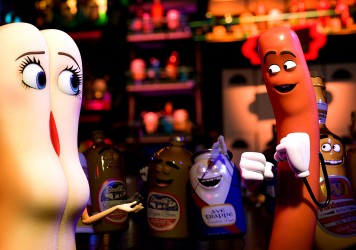Seth Rogen and James Franco topple communism with comic truth bombs in this jolly satire.
For a New York minute there, Seth Rogen and Evan Goldberg’s The Interview was destined to become enshrined in cinematic infamy – a comedy film yanked abruptly from screening venues in an ad-hoc eleventh-hour bid to cool geopolitical tensions between the USA and the Democratic People’s Republic of Korea.
Forget the box office or the critical notices for a moment – how many filmmakers can actually claim to have made something whose shrill comic wail echoed down the corridors of power? It’s the kind of top end, mountain-moving relevance that politically-hued documentary films would crave, that polemicists such as Michael Moore would bite someone’s finger off just to brush the hem of its symbolic garment.
Furore aside, this is a film that would have likely floated down the chute largely unnoticed, probably accompanied by some thinkpiece-shaped bracken, and possibly to the sound of a few mild titters. Maybe “impact” is the wrong term to describe the effect it had. It left an imprint. A humongous, multi-taloned, indefinable, ugly imprint. It was a little like Joe Dante’s film Matinee, in which a the life-affirming magic of the nickelodeon was employed as a distraction from the Cuban Missile Crisis, except here, it was the cinema causing the Cuban Missile Crisis. And were the film not good enough, its satire not barbed enough, its jokes not vulgar enough, its politics not un-PC enough, no-one would’ve given a damn.
Or, at least that was what the news agenda wanted us to think. Every minute twist in the plot came foreshadowed by idle speculation and then chased with in-depth interpretations and crass opinionising. And what could be more juicy than a film about a plot to assassinate Kim Jong-un than a film about a plot to assassinate Kim Jong-un which results in Kim Jong-un wanting to liquidate the western world? Whether this was the invented media narrative or the facts of the matter are irrelevant, it’s the fact that we’ll never really know which is the sad thing, unless some brave soul wants to dive back into that particular content bog and fish for the pearls of truth, such as they are.
But the big reveal at the end of this nail-biting thriller plotline was that, finally, no-one actually cared. The world didn’t end. People seemed to shuffle if not flock to see this movie which had, by political proxy, secured more gratis prime-time advertising than all the studios combined could every hope to fork out for. And you can’t help but applaud the irony of this all being a about a film which skewers the venality of infotainment and cultural dumbing-down, but also says that the media does possess a power which can topple nations far more effectively than concealed strips of ricin.
Whether the film is good or bad is irrelevant, as its work was done long before it (eventually) hit cinemas. And it would essentially have to be a Renoir-level masterpiece to live up to the story of its own making, and without sounding disingenuous, it ain’t that. Maybe a good comparison would be Joseph Mankiewicz’s Cleopatra or Otto Preminger’s Rosebud, films that are far more interesting to talk about than to actually watch.
Published 5 Feb 2015
During December of 2014, anticipation rose to an unprecedented score of 44.
Funny and sharp enough to warrant the furore.
Hard to tell if there will be more or less of this kind of button-pushing in the future. Hopefully more.

It's the animated, existentially-inclined talking junk food comedy the world has been waiting for.

Is the much maligned actor actually the most underrated performer of his generation?

Ho-ho-hell no. This seasonal caper starring Seth Rogen is about as funny as Christmas cracker gag.